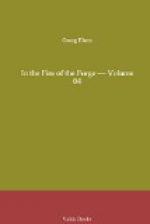What did this mean?
If the girl had vanished at midnight and not returned to her employers since, she could scarcely have sought Heinz Schorlin as a messenger of love from Els. But if she had not come to the Swiss from one of the Es, what proof did he, Seitz, possess of the guilt of his brother-in-law’s bride? How should he succeed in making Wolff understand that his beloved Els had wronged him if the maid was to play no part in proving it? Yesterday evening he had not believed firmly in her guilt; that very morning it had even seemed to him a shameful thing that he had cast suspicion upon her in the presence of others. The encounter with the maid at the Swiss knight’s lodgings had first induced him to insist on his accusation so defiantly. And now? If Heinz Schorlin, with the help of the Ortliebs, succeeded in proving the innocence of those whom he had accused, then—ah, he must not pursue that train of thought—then, at the lady’s accusation, he might be deprived of the right to enter the lists in the tournament; then all the disgrace which could be inflicted upon the slanderous defamer of character threatened him; then Wolff would summon him to a reckoning, as well as Heinz Schorlin. Wolff, whom he had begun to hate since, with his resistless arm of iron, he had exposed him for the first time to the malicious glee of the bystanders in the fencing hall.
Yet it was not this which suddenly bowed his head and loudly admonished him that he had again behaved like a reckless fool. Cowardice was his least fault. He did not fear what might befall him in battle. Whether he would be barred out from the lists was the terrible question which darkened the bright morning already verging towards noon. He had charged Els with perfidy in the presence of others, and thereby exposed her, the plighted bride of a knight, to the utmost scorn. And besides—fool that he was!—his brothers had again attacked a train of waggons on the highway and would soon be called to account as robbers. This would certainly lead the Swiss and others to investigate his own past, and the Pursuivant at Arms excluded from joust and tourney whoever “injured trade or merchant.” What would not his enemy, who was in such high favour with the Emperor, do to compass his destruction? But—and at the thought he uttered a low imprecation—how could he ride to the joust




